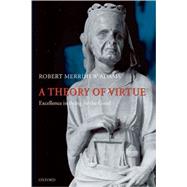
Note: Supplemental materials are not guaranteed with Rental or Used book purchases.
Purchase Benefits
What is included with this book?
| What is virtue? | |
| Introduction | p. 3 |
| The Subject Matter | p. 3 |
| Virtue and Right Action | p. 6 |
| Outline | p. 11 |
| Excellence in Being for the Good | p. 14 |
| Being for | p. 15 |
| The Goods that Virtue is For | p. 19 |
| Excellence as Criterion of Virtue | p. 23 |
| Virtue and the Virtues | p. 31 |
| Wickedness and Vices | p. 36 |
| Virtue and the Vices | p. 36 |
| Vices of Weakness and of Excess | p. 37 |
| Satanic Wickedness | p. 38 |
| Malice | p. 41 |
| Vices of Ruthlessness and Indifference | p. 44 |
| Virtue and its Benefits | p. 48 |
| Human Flourishing | p. 48 |
| Variations on Trait Consequentialism | p. 53 |
| Does Virtue Pay? | p. 60 |
| Self and Other | |
| Altruism | p. 65 |
| Does it Matter Whether Altruism is Excellent? | p. 66 |
| What's so Excellent about Altruism? | p. 73 |
| Impure Benevolence and Justice as a Virtue | p. 77 |
| Self-Sacrifice | p. 81 |
| Common Projects | p. 84 |
| A Moral Phenomenon to be Explained | p. 84 |
| Common Projects and Human Good | p. 86 |
| Common Projects and Altruism | p. 90 |
| Self-Love and the Vices of Self-Preference | p. 95 |
| Butler and the Harmony of Self-Love with Benevolence | p. 95 |
| Selfishness | p. 98 |
| Self-Centeredness and Vices of Cognitive Self-Preference | p. 102 |
| Unselfish Self-Love | p. 105 |
| Are There Really any Virtues? | |
| Moral Inconsistency | p. 115 |
| Traits and Situations: A Challenge | p. 115 |
| Direct Behavioral Dispositions | p. 120 |
| Traits of Motivation and Thought | p. 130 |
| Affiliations and Social Roles | p. 138 |
| Moral Frailty and Moral Luck | p. 144 |
| Situationist Experiments and the Frailty of Virtue | p. 144 |
| Social Temptations | p. 152 |
| Can Virtues Be Frail and Dependent? | p. 155 |
| Moral Luck | p. 158 |
| Moral Effort and Moral Character | p. 161 |
| Virtue as Gift | p. 165 |
| Do the Virtues All Imply Each Other? | p. 171 |
| The Idea of the Unity of the Virtues | p. 171 |
| Courage | p. 175 |
| Wisdom | p. 184 |
| Benevolence | p. 189 |
| Plural and Integrated Virtue | p. 200 |
| Is Virtue Necessarily Complete? | p. 201 |
| Moral Integration and Virtue | p. 206 |
| Can Virtue Be Taught? | p. 212 |
| Elementary Tasks | p. 213 |
| Modular Tasks | p. 216 |
| Integrative Tasks | p. 221 |
| Should Virtue Be Taught? | p. 229 |
| Bibliography | p. 233 |
| Index of Virtues and Vices | p. 241 |
| General Index | p. 244 |
| Table of Contents provided by Ingram. All Rights Reserved. |
The New copy of this book will include any supplemental materials advertised. Please check the title of the book to determine if it should include any access cards, study guides, lab manuals, CDs, etc.
The Used, Rental and eBook copies of this book are not guaranteed to include any supplemental materials. Typically, only the book itself is included. This is true even if the title states it includes any access cards, study guides, lab manuals, CDs, etc.